KAYLA: LetÔÇÖs build a fairground for our virtual city.
ZACH: Ah yes, with a circus and rides, and lots of stalls.
KAYLA: Sweet! It can go in the park.
ZACH: Where is everything going to go?
ADA: You need to plot things out to the coordinate grid before you build.Why donÔÇÖt we start with the big circus tent?
KAYLA: Okay. But what are these lines here?
ADA: These lines are the axes.The horizontal axis is called the X axis, and the vertical axis is called the Y axis.
ZACH: Ah look, there is our tent shape on the grid.
ADA: How would you describe the position of the tent?
KAYLA: ItÔÇÖs in the top right bit.
ADA: Each of the sections is called the quadrant.That one is the first quadrant.Can you tell me the position of this vertex?Vertex is the name for where two lines on a shape meet.
KAYLA: Y2.
ZACH: X3.
ADA: Those measurements are correct, but with coordinates, you must always do X (the horizontal axis), before Y (the vertical).So, the coordinates of that vertex are (3, 2).You write them like this, in brackets, with a comma between.How about this vertex?
KAYLA: X3 and Y5.
ZACH: And this vertex is X6, Y5.
KAYLA: And the last one is X6, Y2.
ZACH: Okay, letÔÇÖs build it.Uh-oh, I think we have a problem.Half the circus is in the pond.[QUACK]
ADA: You need to translate the shape.That means to move it.If you translate it four down and one left, that will get it out of the water.Make sure you do one vertex at a time.
KAYLA: Okay, so if we go four down and one across, the yellow one becomes X2, and Y-2.
ZACH: The pink one is now (2,1).The blue one is now (5,1) and the white one, (5,-2).
KAYLA: LetÔÇÖs build it.ThatÔÇÖs better.
ZACH: Oh, I know. LetÔÇÖs put a row of fairground stalls in here next.
KAYLA: And we should have another row of them to match on the other side of the path.
ADA: To do that, you need to reflect the shape.
ZACH: How do you reflect a shape?
ADA: This dotted line is the mirror line.This vertex is one above the mirror line.Therefore, in the reflected shape, it will be one below the mirror line.
KAYLA: I see, and the next vertex is two above the mirror line.So, that will reflect to two below.
ZACH: One above becomes one below here.
KAYLA: And two above becomes two below.Done. A perfect mirror image!LetÔÇÖs build it.
ZACH: Have fun, Ada!
ADA: Fun. Let me seeFun: enjoyment, amusement or lighthearted pleasure.Hmm I believe I shall have fun at the fair.
Kayla and Zach are designing a fairground for their virtual city.
They need to plot the different rides on a coordinate grid, so they know where everything will go.
The screen displays a grid with four quadrants. Ada teaches Zach and Kayla about the x-axis and y-axis on the grid, before then explaining the quadrants, which are labelled clearly.
They discuss how to find and record the coordinates of a point on the grid, in this case the vertices of a square. The circus tent they are building appears on the grid, but itÔÇÖs in the wrong place, so Ada explains how to translate the shape across and down to a different place on the grid, moving one vertex at a time.
They decide to put in a row of fairground stalls. Ada explains how to use a mirror line to reflect the row of fairground stalls, to produce a matching row of stalls on the other side.
This short animated film is from the ┤¾¤¾┤½├¢ Teach series, Neon City: Measurement and Geometry.
Download/print an A4 activity sheet for this episode (PDF, 312KB). See link below for answers.
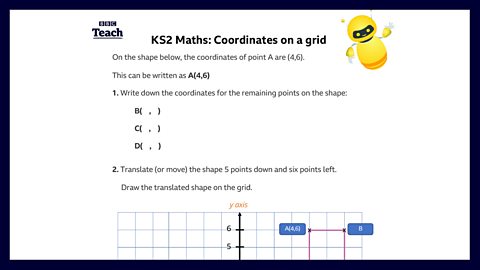
Teacher notes
(PDF, 690KB)
Before watching
You might want to recap learning from previous years, such as finding coordinates in the first quadrant, identifying the x and y axes and knowing which axis to look at first.
During the episode
Depending on the childrenÔÇÖs prior knowledge, you may wish to pause the film and spend some time discussing the elements of the grid, such as the positive and negative numbers on each axis. Ask questions to check for understanding, such as; which way to you need to move on the x-axis to get to the negative numbers?'
You might want to give the children an opportunity to translate or reflect the given shapes themselves before seeing how their answer compares to Zach and KaylaÔÇÖs. You might want to ask questions to check for understanding, such as; how is reflecting different to translating?
After watching
You could ask children to design their own ideal fairground or park, by plotting the different elements on a grid.
They could then work with a partner to translate or reflect the various parts of their plan. You could give them some examples of shapes that have been plotted incorrectly (for example, the shape was supposed to be a square but the fourth vertex is incorrectly placed) and ask them to correct the mistake by identifying the correct coordinate.
You could ask the children to reflect a shape in each of the four quadrants and identify the new coordinates.
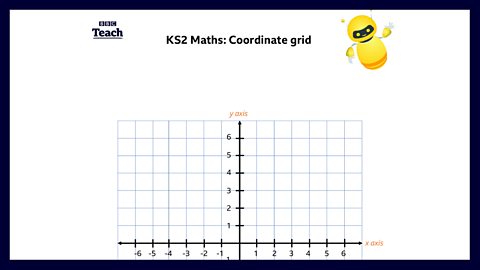
Curriculum notes
This short film is suitable for teaching maths at KS2 in England and Northern Ireland, 2nd Level in Scotland and Progression steps 2 and 3 in Wales.
More from Neon City: Measurement and Geometry
Measuring area. video
Ada introduces Zach and Kayla to the concept of area, and different ways to measure and calculate the area of rectangles, triangles and composite shapes.

Perimeter. video
Zach and Kayla are creating windows for their virtual house design and Ada explains how they can work out the perimeter for the windows they want.
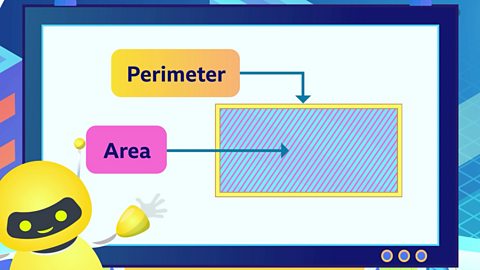
Volume. video
Kayla and Zach decide to build a swimming pool for their virtual city and Ada explains how to calculate the volume and capacity of a cuboid shape.
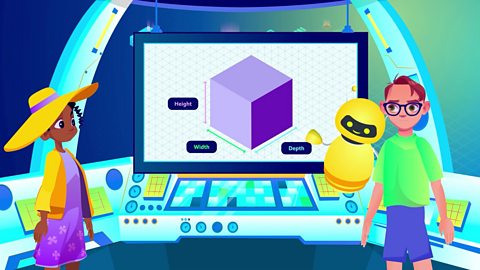
Metric and imperial measurements. video
Kayla and Zach decide to build a new hovertrain system from the city to the beach, but they get confused between kilometres and miles. Ada explains how to calculate betwen the two measurement systems, metric and imperial.

Measuring angles - Part 1. video
Kayla and Zach are designing ramps for the skatepark and Ada explains that designing ramps requires us to measure angles ÔÇô the amount of turn between two lines.
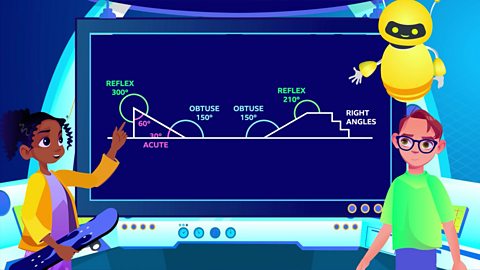
Measuring angles - Part 2. video
Whilst adding ramps to their virtual skatepark, Zach and Kayla progress from measuring angles to calculating angles on a straight line and full turn.

Missing lengths and angles. video
A computer virus has corrupted the Neon City software. Zach and Kayla must answer four questions within three minutes, or their city will be erased.

Regular and irregular polygons. video
ZachÔÇÖs design for a pond in the virtual city park leads to Ada explaining the properties of regular and irregular polygons.
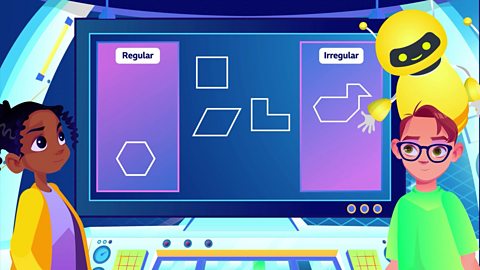
Units of time. video
Ada asks Kayla and Zach a series of quiz questions, requiring them to convert from one time measurement unit to another.
